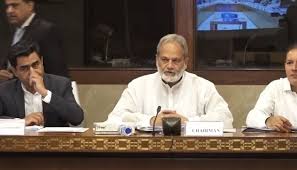
ISLAMABAD – July 2025: The National Assembly’s Standing Committee on Federal Education, Professional Training, National Heritage and Culture held its 15th session on Friday, chaired by MNA Dr. Azim Uddin Zahid Lakhvi. The session addressed key concerns around accreditation practices, regularization of contract employees, and preservation of Pakistan’s cultural and educational infrastructure.
NAVTTC Accreditation Process Under Scrutiny
One of the primary issues discussed was the performance and procedural shortcomings of the National Vocational and Technical Training Commission (NAVTTC). The committee raised serious objections to the accreditation and reaccreditation of technical and vocational training institutes across the country.
Members highlighted that NAVTTC’s evaluation mechanisms lack transparency, proper monitoring, and post-accreditation oversight. The committee urged immediate reforms to address these inefficiencies and recommended establishing a third-party audit framework to ensure that institutions meet national and international skill development standards. Concerns were also raised regarding the lack of industry-aligned curricula and outdated training infrastructure in accredited institutions.
Call for Inclusive Employee Regularization
The committee strongly advocated for the comprehensive regularization of all long-serving contract employees in the education sector. This includes:
- Teaching and non-teaching contract staff of the Pakistan Madrassah Education Board (PMEB) who have served for over 15 years.
- Daily-wage teachers and lecturers serving in Islamabad Model Colleges.
- Employees of the National Institute of Science and Technical Education (NISTE) and the National Skills University (NSU) whose regularization cases remain unresolved.
In response to continued committee advocacy, a Cabinet Committee has been constituted to prepare a legislative framework addressing these regularization concerns. The matter is now under parliamentary review, with proposed legislation expected in the upcoming National Assembly session.
Heritage Protection: DOAM’s Expanding Role
The Department of Archaeology and Museums (DOAM) delivered an extensive briefing on its national mandate. The department oversees 407 nationally protected archaeological sites and monuments, six of which are in Islamabad. It also manages 14 museums nationwide, and has partnerships with UNESCO and the International Council of Museums (ICOM) for conservation and repatriation efforts.
Notably, DOAM reported the recovery of over 1,125 stolen or smuggled antiquities through bilateral cooperation with international enforcement agencies in the US, UK, France, and Italy. Conservation projects at key heritage sites, including Rawat Fort and Shah Allah Ditta Caves, were cited as significant achievements despite budgetary and staffing constraints.
Committee members expressed unanimous appreciation for DOAM’s efforts and pledged legislative and financial support to ensure the preservation of Pakistan’s cultural and civilizational heritage.
Pakistan Institute of Education: Strengthening Data for Policy
The Pakistan Institute of Education (PIE) presented an update on its activities post-18th Amendment. Established to serve as a centralized education data agency, PIE is responsible for:
- Coordinating data from provincial education departments via its Management Information System (MIS) Wing.
- Conducting national learning assessments.
- Providing research-based policy input, particularly on out-of-school children and SDG-4 monitoring.
PIE highlighted its ongoing partnerships with UNESCO, LUMS, and other research institutions to improve the reliability of education data and support evidence-based policymaking. The committee underscored the importance of such data in shaping sustainable and inclusive education reforms.
High-Level Attendance and Institutional Oversight
The session was attended by key members of the National Assembly, including Anjum Aqeel Khan, Syeda Nosheen Iftikhar, Zulfiqar Ali Bhatti, Farah Naz Akbar, Mussarat Asif Khwaja, Dr. Shazia Sobia Aslam Soomro, Mehtab Akbar Rashdi, Mussarat Rafique Mahesar, Abdul Aleem Khan, Sabheen Ghoury, Dawar Khan Kundi, Fiaz Hussain, Muhammad Aslam Ghumman, Wajiha Qamar, and Muhammad Moin Aamer Pirzada.
Senior officials from the Ministry of Federal Education and Professional Training, Higher Education Commission (HEC), NAVTTC, DOAM, and PIE were also present to respond to questions and present departmental updates.

